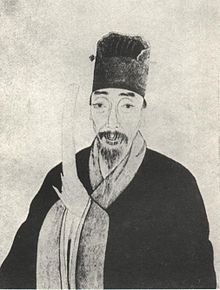Liu Zongzhou (simplified Chinese: 刘宗周; traditional Chinese: 劉宗周; pinyin: Liú Zōngzhōu, 1579–1645), also known as Liu Jishan (simplified Chinese: 刘蕺山; traditional Chinese: 劉蕺山), was a Confucian scholar from the Ming dynasty, born in Shanyin, Shaoxing. He is considered the last master of Song-Ming Neo-Confucianism and is known for his criticism of the teachings of Wang Yangming.[1] After the Ming dynasty was destroyed by the Qing dynasty, Liu Zongzhou died on 8 June of the self-imposed starvation at age 68.[2]

One of his students Zhu Yuan (祝淵) committed suicide by hanging himself.[3] Another one of his students Wang Yushi (王毓蓍) committed suicide by drowning himself.[4]
Along with Hu Hong, Liu Zongzhou's thoughts are regarded as part of a third stream of Neo-Confucianism by Mou Zongsan.
References
edit- ^ Pan, Jen-tai (April 2010). "Liu Zongzhou's Criticism of Wang Yangming's Followers and his Scheme for Moral Reformation". Ming Studies. 2010 (61): 13–55. doi:10.1179/014703710x12772211565909. S2CID 171012801.
- ^ "Liu Zongzhou". Shaoxing Government. Archived from the original on 2012-08-11. Retrieved 2013-04-09.
- ^ Chen Que (陳確)《哭祝子开美》诗序云:“盖初六日之子刻也。越二日而山阴先生亦绝食死。”,《陈确集》
- ^ 《玉光剑气集》卷六《忠节》
- Hummel, Arthur W. Sr., ed. (1943). . Eminent Chinese of the Ch'ing Period. United States Government Printing Office.